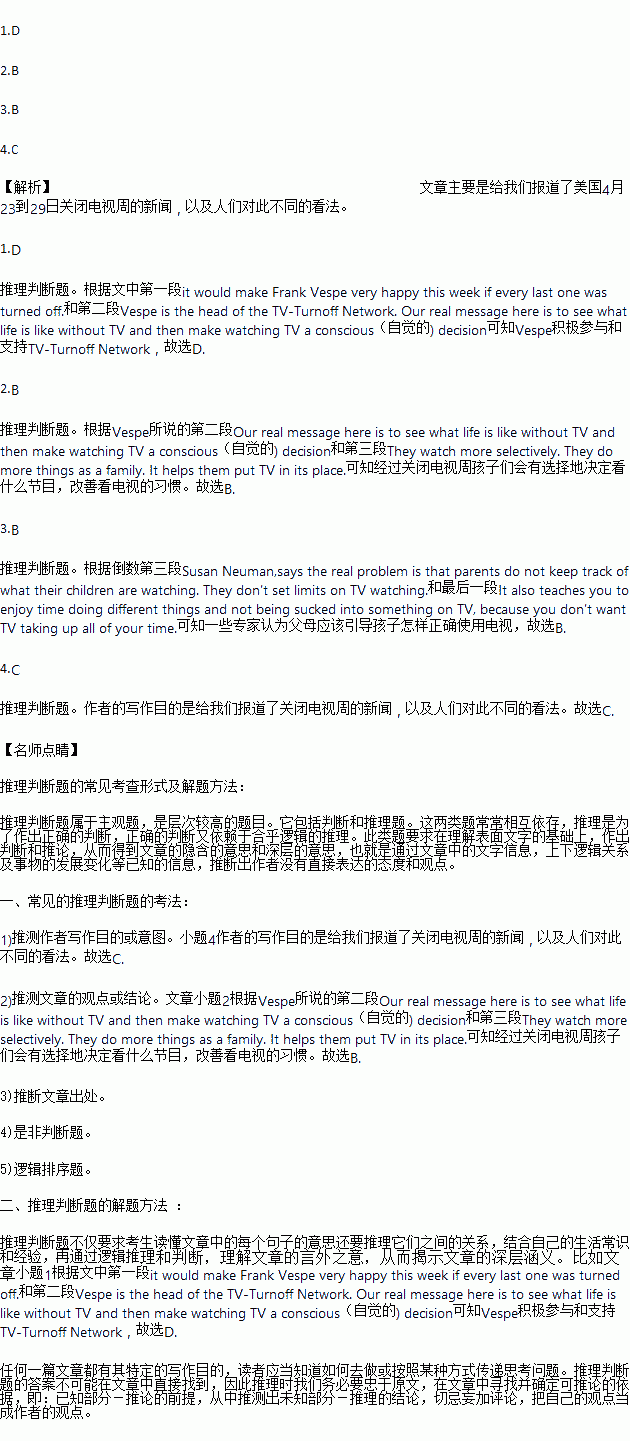题目内容
WASHINGTON—There are more than 222million TVs in American homes. And it would make Frank Vespe very happy this week if every last one was turned off.
Vespe is the head of the TV-Turnoff Network. the Washington organization behind TV Turnoff Week. For TV Turnoff week, American children are encouraged to go one week without watching TV. This year, it runs from April 23~29.“Our real message here is to see what life is like without TV and then make watching TV a conscious(自觉的) decision,”said Vespe.
Vespe said that most of the children who go without television for a week go back to watching, but not so much.“They watch more selectively. They do more things as a family. It helps them put TV in its place.”One girl who is turning off her TV is Sarah Foote, 9.of Virginia. Sarah admits that it won’t be too hard to give up TV. She’s allowed to watch only educational television, and he favorite show from last year isn’t on any more.
Of course, there are plenty of things about TV: programs can be entertaining, even educational.
Even so, some experts aren’t sure TV Turnoff Week is the answer.
Susan Neuman, a university educator who studies children and reading ,says the real problem is that parents do not keep track of what their children are watching. They don’t set limits on TV watching. Also, in some families, TV might be the only thing to do.
What message does Sarah have for other children?
“It’s a very good idea. I spent a whole week without TV. It also teaches you to enjoy time doing different things and not being sucked into something on TV, because you don’t want TV taking up all of your time.”Sarah said.
1.From the first two paragraphs we know that .
A. American TV companies will be turned off
B. American families have more TV sets than they need
C. Vespe has persuaded most people to turn off their TV sets
D. Vespe is an active person in the TV-Turnoff organization
2.As Vespe said in this passage, turning off TV a week can help children .
A. forget to watch TV programmes B. improve their habits of watching TV
C. place TV sets out of their bedrooms D. have part-time jobs after school
3.In some experts’ opinion .
A. parents should turn off TV for their children
B. parents should teach their children how to use TV
C. children should enjoy exciting programmes on TV
D. children should learn their lessons on TV
4.What’s the author’s purpose in writing this passage?
A. To advise us to turn off TV sets. B. To warn parents of the danger of TV.
C. To report to us a piece of news about TV. D. To praise Vespe and his organization.
 新课标快乐提优暑假作业陕西旅游出版社系列答案
新课标快乐提优暑假作业陕西旅游出版社系列答案 暑假衔接培优教材浙江工商大学出版社系列答案
暑假衔接培优教材浙江工商大学出版社系列答案 欣语文化快乐暑假沈阳出版社系列答案
欣语文化快乐暑假沈阳出版社系列答案
